Hours before a screen and exorbitant fees have inspired some Mumbai parents to pull their children out of schools for a gap year and lessons drawn from real-life
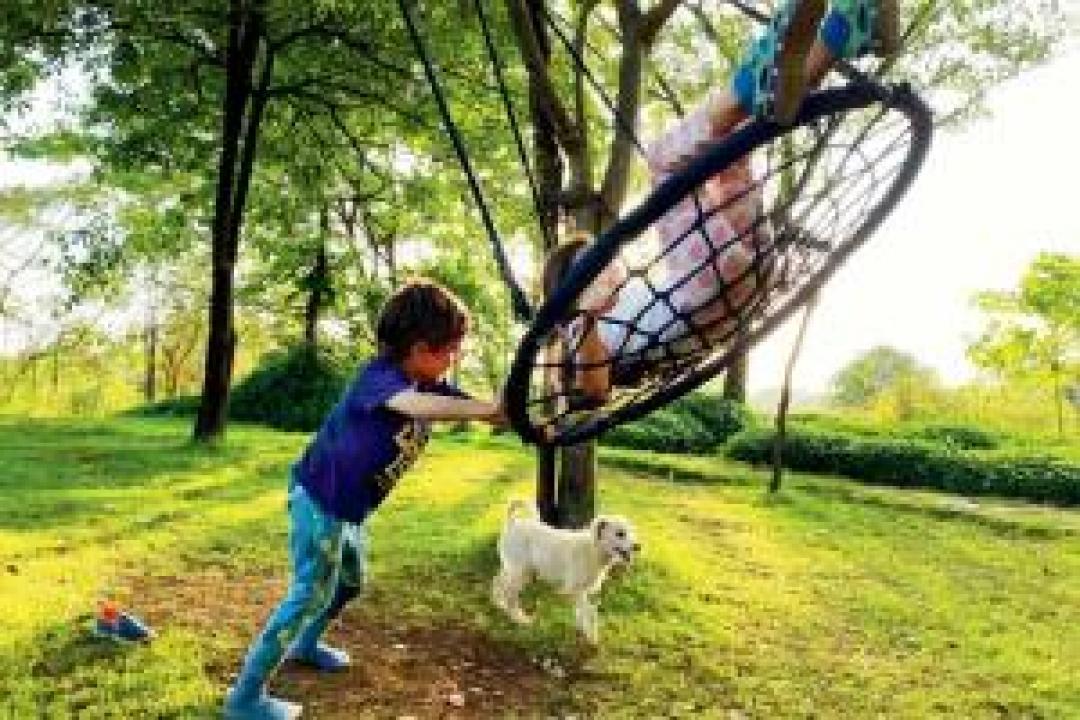
Independent photographer Ashima Narain and husband Matthew Spacie gave up their Khar home and moved to Karjat when the lockdown was announced. Now their kids-Saira, 7, Jahanara, 5, and Samar, 4-study reptile behaviour, have signed up for a naturalist cour
MORNINGS are messy for Saira, Jahanara and Samar Spacie. Where 7 am once meant dragging their groggy selves out of bed for school, a splash in the gurgling river has now replaced this monotony. Sometimes, when they have more time on their hands, the siblings scramble up the craggy branches of a tree, or just sway below, on a rope that serves as a makeshift swing. Despite the frenetic cramming of activity quite early in the day, the kids are breakfasted and ready for class at 9 am sharp. Their headmistress is their mother, independent photographer Ashima Narain, who describes herself as "strict and shouty," and "temperamentally unsuited" to teach primary school kids. But, since June, this has been her life. Her holiday home in Karjat is the centre of new learning.
ADVERTISEMENT
Narain has been home-schooling her children—aged seven, five and four—for the last four months. She and husband Matthew Spacie, after much thought and deliberation, decided to take the kids out of school. This wasn't part of the plan. But neither was the pandemic, and the subsequent lockdown, which led the Spacies, who lived in a rented apartment in Khar, to adapt to the bucolic life in rural Maharashtra.
The family arrived in Karjat in March, soon after their children-s school in Mumbai announced it was shutting for two weeks due to the Coronavirus scare. "We decided to ring in my younger daughter's [Jahanara] fifth birthday in Karjat, and also spend the rest of the holidays here. And then, the lockdown was announced, and we were forced to stay put," recalls Narain.
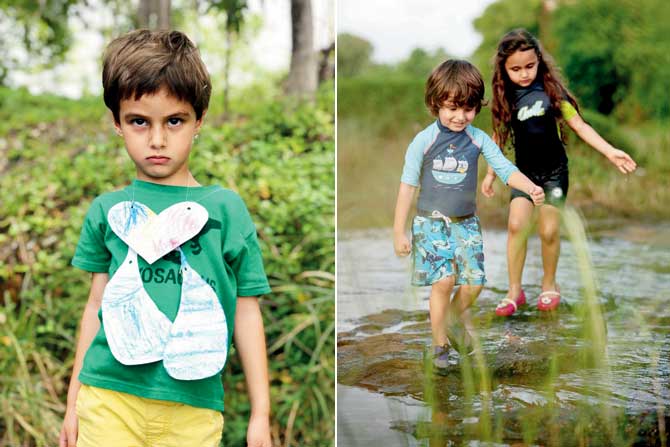
Freelance photographer Ashima Narain has been home-schooling her children—Saira, 7, Jahanara, 5, and Samar Spacie, 4—for the last four months at their Karjat home. She took them under her wing after the children were taken out of school, and the family gave up their rented flat. As part of the curriculum, the children did a slew of herpetology and naturalist courses. They-ve also been learning horse-riding
By April, many city schools, realising that the lockdown was going to be more long-term than initially assumed, had switched to online classes. From a physically vibrant and interactive space, the classroom had turned in some cases into a virtual screen of chaos, where the teacher and students communicated in isolation, and the parents became uninvited spectators.
Narain's problems were compounded by the fact that they had no WiFi or mobile connectivity at their Karjat home. "We had paid their [school] fees, and didn't know better how long this was going to last. So, we decided to continue with the classes," says Narain. The couple found an office building not too far away from their home, where connectivity was decent. "But we had to walk a kilometre every day, through a jungle, to reach the building—I'd go back and forth six times a day, with different children for different classes. And all of this in the summer heat, with a stick in hand, because we had snakes coming out of everywhere." What made it worse was that the children had no experience of sitting for Zoom calls. "By May, I had reached the end of my tether," she shares.
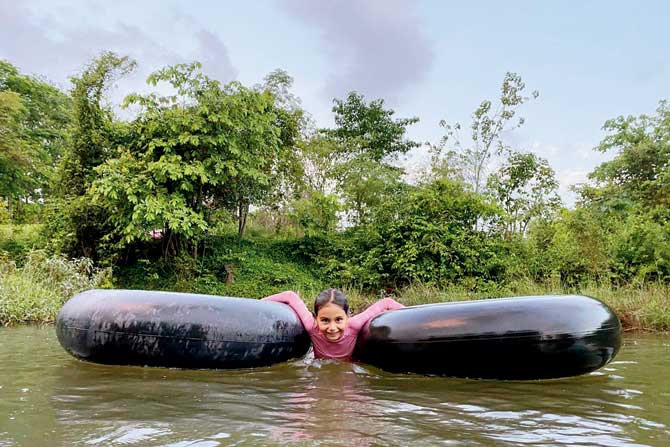
Home-schooling was less an option, and more a necessity for Narain, who had her hands full and was finding it difficult to keep up, alongside her freelance work. "I knew that the situation wasn't going to get better soon. It only made sense to get the kids out of school." The online schooling system that was neither children nor parent-oriented, she says, was just the tipping point. "What had been brewing for long were deeper considerations on how we operate in cities, in our families, and the relationships we forge based on time. The lockdown, and online schooling created an opportunity—for an alternative way of living, to experiment with the notions that had been playing out in my mind." In June, the couple gave up their flat and moved lock, stock and barrel to Karjat. "We also got ourselves a new Internet connection here." For every naysayer, there was someone who assured them that their decision to home-school would augur well. "I just felt there was something there [in home-schooling]. Here was an opportunity to think about education differently, and be in a position to not complain about what you think your children should be learning, what they are learning, or what is amiss, because now, you are in control."
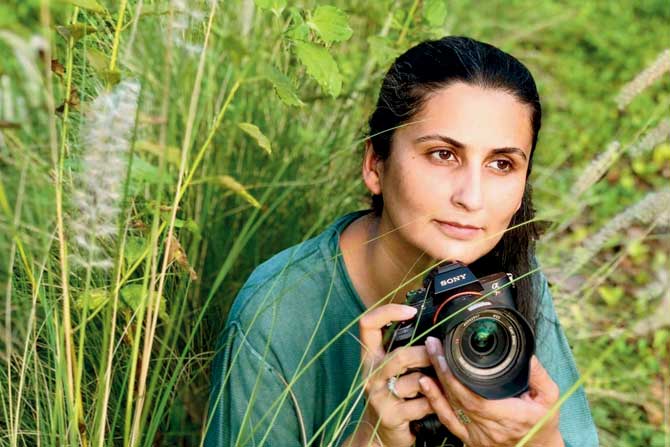
Ashima Narain
A recent survey of 1,075 parents from across the United States, conducted by Morning Consult, a data intelligence and market research company, and published by The New York Times, revealed "that several families who didn't home-school before the pandemic were surprised to find that, post-shutdown, their children seemed to do better outside a traditional school environment."
Delhi-based educator and heritage activist Vikramjit Singh Rooprai says he would have never considered home-schooling, had COVID-19 not made an unwelcome entry into their lives. In June, his family, including his parents and two children, tested positive for the virus. "We were in quarantine for nearly two months," he says. When they got better, his daughter, Sartaj Kaur, 10, and son Virpratap Singh, 6, had to immediately start online classes. "But they were so weak from the illness that they couldn't sit in front of the screen for even 30 minutes. The classes would go on for four to five hours."

Vikramjit Singh Rooprai
Rooprai says he spoke to the teachers. Their suggestion was to have the kids sit in class when they could, as long as homework was completed on time. "My son was not even able to understand basic concepts. This meant that I had to teach him. And I didn't mind that, but then I didn't need them [school teachers]." Unable to get an appointment with the principal, he sent an email to the authorities about considering pulling his children out of school. "I assumed they-d agree to have a conversation with me [on this]. To our shock, they removed me and my wife from all the school WhatsApp groups. We also stopped getting any email notifications. After a few days, I got a call saying I could come and collect all the documents. So yes, we weren't really left with an option. To be honest, I was considering home-schooling during the lockdown, but it became more real, after the school acted in haste."
What worked to Rooprai's advantage was that he was already a teacher trainer, training people in experiential learning, liberal arts and project-based teaching. "I don't use the textbook at all, and that makes learning more fun," he says. To drive his point home, he shares how he taught his daughter the concept of profit and loss. "When the lockdown started, my daughter and son set up a dummy restaurant like most kids would, and my wife and I were their guests, along with a few other dolls. We were served plastic food," he laughs. That's when the idea came to him. "I told my daughter [Sartaj], -Beta, why don't you serve us some real food?- She makes good coffee and sandwiches. She did that the next time we were invited to her restaurant. This time, I asked her how much we should pay her. At first, Sartaj was taken aback, but then she said, "R1". I told her that the pricing was impractical, considering the cost of preparing the meal. I then took her to the kitchen, and got her to measure all the ingredients used, on a weighing scale. Based on the calculations, we came up with a more realistic price for her meal, keeping a profit percentage of 20 per cent in mind. We did this exercise for over a month." By the end of it, Rooprai gave her a project, where she had to come up with her own restaurant brand, and a proper menu with prices included. "We ordered from her menu. She made us the food and we even paid for it. After calculating, she returned the cost price to me, as I had paid for the ingredients; the profits went to her. Calculating profit percentage is something students of her class [Class V] will only learn in December. She already knows how to do it."
Like Rooprai, Narain has also resisted the textbook culture. She instead got her children into the habit of journalling every day. Another thing that she did, when she got to prepare the curriculum, was to enrol them for a virtual herpetology course to understand reptiles, due to the snake infestation in the vicinity. "We did this course with Gerry Martin, who lives with 36 Russell-s vipers. You see him handling it [the snake], anesthetising it, and even removing the venom. It-s just a different kind of education that is more appropriate for who they are, and where they are in life, currently," she says. Apart from this, Narain has signed them up for an online naturalist course, where they learn unusual science experiments. The children study for three hours daily; when not studying, extra-curricular activities like ballet, kathak, music, taekwondo and art projects keep them occupied. "I have also included horse-riding in their curriculum. It happens on Fridays, which means there is no teaching that day. I am doing riding lessons with them, too. So, it-s a lot of fun." The truth, says Narain, is that she is learning a lot more than she is teaching.
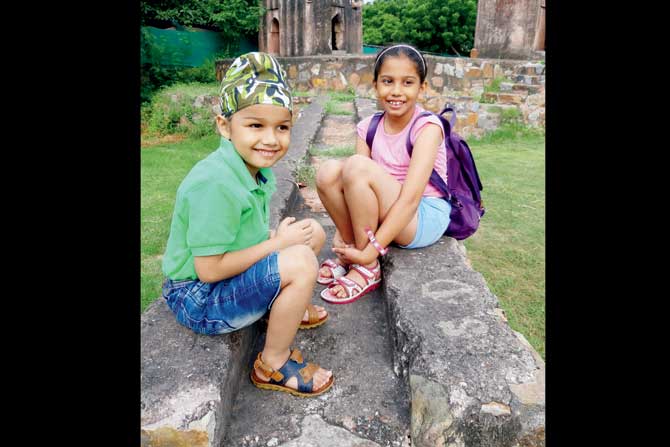
Teacher training professional Vikramjit Singh Rooprai recently took his children, Sartaj Kaur, 10, and Virpratap Singh, 6, to the Munirka Baoli, a stepwell in Delhi, where he taught them about aqueducts and water management in ancient and medieval India
Since Rooprai, a former IT professional, who conducts teaching programmes across the country, is rarely home otherwise, he realises that home-schooling cannot be a long-term option for his children. He is planning to admit them to another school in the next academic year. Narain, on the other hand, might consider home-schooling on a more permanent basis. "Until now, we were banking on a system to bring up our children, but it-s not necessarily the best way, or certainly not the only way. That has been the biggest learning. I feel if I could continue, it would possibly be a better system [for my kids]. You are catering to their interest, and not trying to cram in subjects, because children don-t need to know about all the possibilities in the world. What they need is exposure."
Among the many, who've taken the risk of not sending their children to school this year, are parents of toddlers and pre-schoolers. While it might seem like a safe bet considering their age, not having a nursery foundation, can make admissions to kindergarten cumbersome, claim parents.
PR professional Gandhali Sane's three-year-old daughter Aabha Sane Dalvi was admitted to a pre-school in Colaba last year. "One thing that draws kids to school is their teachers, and my daughter adored hers. But, when the principal decided to start online classes in June, I wasn't quite sure, if this is what I wanted for my child. My husband and I are working parents, and it would have been difficult for us to manage in between work hours."
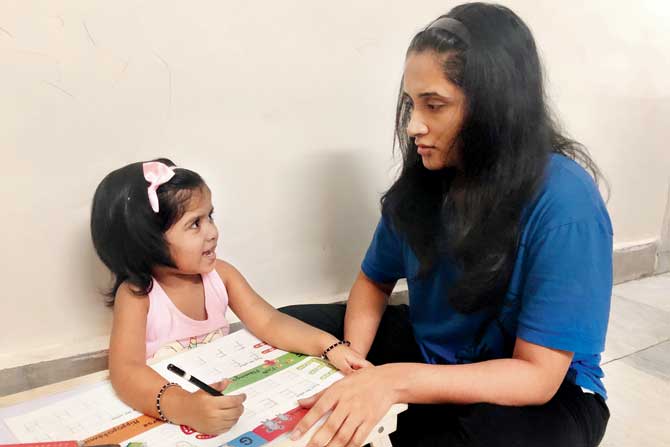
Public relations executive Gandhali Sane and her husband have been teaching their three-year-old daughter Aabha Sane Dalvi to trace letters and numbers on dotted lines. The couple decided to pull the child out of pre-school, partly due to exorbitant fees
The exorbitant fees the pre-school was charging Rs 91,000 for the year, pinched her more. Despite being in two minds, she got her daughter admitted two days before classes resumed in June. Aabha attended online school for two weeks—she even enjoyed the screen-time—but it didn't feel worth all the effort. The engagement of a physical classroom was lacking, so she decided to pull her out. "A lot of parents, including the staff, tried to dissuade me, and even said that it would be impossible for my daughter to get admission to any South Mumbai school next year. But Aabha is a bright kid, and I don't think I need to worry." Sane and her husband spend an hour every evening teaching her. She is currently tracing alphabets and numbers on dotted lines, and learning rhymes. "I try and make learning more practical for her.
When she sees the plank of a bed, she recognises it as a sleeping line. Similarly, when I ask her to show me a circle, she will point to the circular handle of our wardrobe."
Homemaker Sheena Martins managed to secure an admission for her son Evan Rozario, 3, to a pre-school in Kurla, earlier this year. But with the school being non-committal on when it would resume classes, and her own worries about exposing her child to the screen, led her to make the switch. She relied on teaching tips from her sister, who takes home tuitions, and nursery books, given by her sister-in-law. "He studies well with me. What he is possibly missing out on, is interacting with kids his age. Online classes would anyway not allow for that. I am, however, worried that he is going to get too attached to us, and it might get
difficult for him to adjust to school when he joins next year."
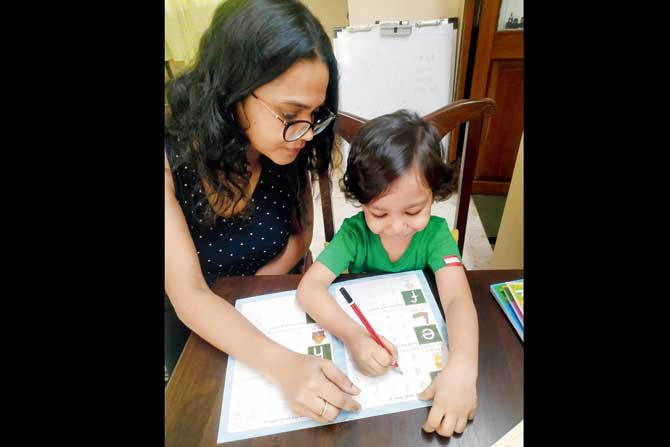
Sheena Martins decided to home-school her son Evan Rozario, 3, as she didn-t want to expose him to excessive screen-time
Being part of Woodstock School, a hallowed co-educational residential institution, in Landour, Mussoorie, was Arjun Menezes's childhood dream. The 16-year-old from Goa and his best friend had planned to join the school together this year. But, due to the lockdown, Menezes held back, while his friend went ahead. "It's bittersweet, of course," he says, "I'd have loved to be in school right now." The decision was a practical one; the family thought it was better to be together at home in Goa, considering how uncertain the times were. "Normally, the school year consists of eight months. But due to the pandemic, we were going to lose out on three months, which is already nearly half the academic year. And while they [school authorities] said they'd try and open up in October, there is a strong chance that they'd not be able to, even if they wished to do it. With a school like Woodstock, close to 90 per cent of its appeal, is the location and the facilities being offered. Spending a school year in a heavily restricted environment would not allow for that," he admits.
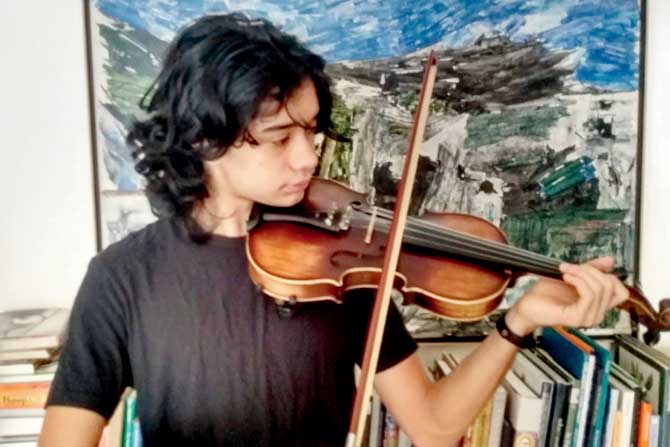
Arjun Menezes, 16, who was to go to Woodstock School in Mussorie after his board exams, has taken a gap year. He is using the time to learn the violin and take online courses
Menezes is instead using the gap year to hone the skills he previously didn't have time for. "I picked up the violin again, after all these years. I even took up internships and some courses online, like 3D modelling. And I'll still get to join my best friend at Woodstock next year." They won't be in the same class, of course. "But we'll still be together."
Keep scrolling to read more news
Catch up on all the latest Mumbai news, crime news, current affairs, and a complete guide from food to things to do and events across Mumbai. Also download the new mid-day Android and iOS apps to get latest updates.
Mid-Day is now on Telegram. Click here to join our channel @middayinfomedialtd and stay updated with the latest news
 Subscribe today by clicking the link and stay updated with the latest news!" Click here!
Subscribe today by clicking the link and stay updated with the latest news!" Click here!







